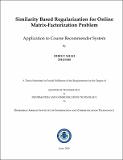Please use this identifier to cite or link to this item:
http://drsr.daiict.ac.in//handle/123456789/626Full metadata record
| DC Field | Value | Language |
|---|---|---|
| dc.contributor.advisor | Shah, Pratik | |
| dc.contributor.author | SHAH, DHRUV | |
| dc.date.accessioned | 2017-06-10T14:44:53Z | |
| dc.date.available | 2017-06-10T14:44:53Z | |
| dc.date.issued | 2016 | |
| dc.identifier.citation | DHRUV SHAH (2016). Similarity Based Regularization for Matrix-Factorization Problem: Application to Course Recommender Systems. Dhirubhai Ambani Institute of Information and Communication Technology, ix, 58p. (Acc.No: T00589) | |
| dc.identifier.uri | http://drsr.daiict.ac.in/handle/123456789/626 | |
| dc.description.abstract | Recommender Systems have played a vital role in the emergence of e-commerce.Given a large amount of data about a user�s purchases, categorizing and generatingparameters that define each user�s behavior over a given set of items hasplenty of benefits for both, the user and the vendor. But determining the best optionsfor a user, comes with a cost. Specially, while dealing with recommender systemsfor niche domains like, University Courses or Massive Open Online Courses(MOOC) recommender systems. In such cases, the choices made by users havea long-term effect on their career. In the same context, it is equally crucial for arecommender to decide what to recommend and what not to recommend. Thus,prediction of user preferences is crucial. Also, every new purchase/choice madeby the user unfolds information about a user which was unknown to the systembefore. These issues have been tackled in past without the use of machine learningtechniques. Representing user�s original preferences (student�s performancein case of course recommender system) as a low-rank matrix has shown encouragingresults. Inclusion of additional information in order to make more accuratepredictions, has also lead to higher computational complexity and instability inlearning parameters. To overcome such hurdles in designing a Course RecommenderSystem, we propose a similarity based regularization for low-rank matrixfactorization algorithm which learns the prediction matrix very fast and is stable. | |
| dc.publisher | Dhirubhai Ambani Institute of Information and Communication Technology | |
| dc.subject | E-Commerce | |
| dc.subject | MOOC | |
| dc.subject | Collabarative Filtering | |
| dc.subject | Machine Learning Approch | |
| dc.subject | Recommender System | |
| dc.subject | Matrix Completion | |
| dc.classification.ddc | 381.142 DHR | |
| dc.title | Similarity based regularization for online matrix- factorization problem: Application to course recommender systems | |
| dc.type | Dissertation | |
| dc.degree | M. Tech | |
| dc.student.id | 201411040 | |
| dc.accession.number | T00589 | |
| Appears in Collections: | M Tech Dissertations | |
Files in This Item:
| File | Description | Size | Format | |
|---|---|---|---|---|
| 201411040.pdf Restricted Access | 1.59 MB | Adobe PDF |  View/Open Request a copy |
Items in DSpace are protected by copyright, with all rights reserved, unless otherwise indicated.
